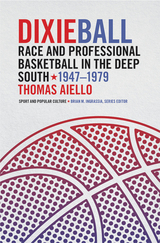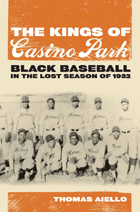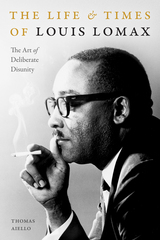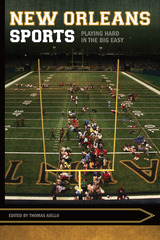5 books about Aiello, Thomas

Dixieball
Race and Professional Basketball in the Deep South, 1947–1979
Thomas Aiello
University of Tennessee Press, 2019
In this book Thomas Aiello considers the special cultural function of professional basketball in the Deep South over the half century between 1947 and 1979. Next to their counterparts in baseball and football, basketball fans enjoyed a unique intimacy with their favorite players, who showed more of their bodies and had nothing covering their face and head. For this and other similar reasons, blackness simply mattered more in basketball than it did in other sports. By the time Lyndon Johnson signed the Voting Rights Act, professional basketball was 47.5 percent black and becoming known as a “black sport.” That being the case, the South’s relationship with professional basketball was more fraught, and made the survival of southern teams more tenuous, fan support more fickle, and racial incidents between players and fans more hostile.
[more]

The Kings of Casino Park
Black Baseball in the Lost Season of 1932
Thomas Aiello
University of Alabama Press, 2011
In the 1930s, Monroe, Louisiana, was a town of twenty-six thousand in the northeastern corner of the state, an area described by the New Orleans Item as the “lynch law center of Louisiana.” race relations were bad, and the Depression was pitiless for most, especially for the working class—a great many of whom had no work at all or seasonal work at best. Yet for a few years in the early 1930s, this unlikely spot was home to the Monarchs, a national-caliber Negro League baseball team. Crowds of black and white fans eagerly filled their segregated grandstand seats to see the players who would become the only World Series team Louisiana would ever generate, and the first from the American South.
By 1932, the team had as good a claim to the national baseball championship of black America as any other. Partisans claim, with merit, that league officials awarded the National Championship to the Chicago American Giants in flagrant violation of the league’s own rules: times were hard and more people would pay to see a Chicago team than an outfit from the Louisiana back country. Black newspapers in the South rallied to support Monroe’s cause, railing against the league and the bias of black newspapers in the North, but the decision, unfair though it may have been, was also the only financially feasible option for the league’s besieged leadership, who were struggling to maintain a black baseball league in the midst of the Great Depression.
Aiello addresses long-held misunderstandings and misinterpretations of the Monarchs’ 1932 season. He tells the almost-unknown story of the team—its time, its fortunes, its hometown—and positions black baseball in the context of American racial discrimination. He illuminates the culture-changing power of a baseball team and the importance of sport in cultural and social history.
[more]

The Life and Times of Louis Lomax
The Art of Deliberate Disunity
Thomas Aiello
Duke University Press, 2021
Syndicated television and radio host. Serial liar. Pioneering journalist. Convicted criminal. Close ally of Malcolm X and Martin Luther King Jr. Publicity-seeking provocateur. Louis Lomax's life was a study in contradiction. In this biography, Thomas Aiello traces the complicated and fascinating arc of Lomax's life and career, showing how the contradictions, tumult, and inconsistencies that marked his life reflected those of 1960s America. Aiello takes readers from Lomax's childhood in the Deep South to his early confidence schemes to his emergence as one of the loudest and most influential voices of the civil rights movement. Regardless of what political position he happened to take at any given moment, Lomax preached “the art of deliberate disunity,” in which the path to democracy could only be achieved through a diversity of opinions. Engaging and broad in scope, The Life and Times of Louis Lomax is the definitive study of one of the civil rights era's most complicated, important, and overlooked figures.
[more]

New Orleans Sports
Playing Hard in the Big Easy
Thomas Aiello
University of Arkansas Press, 2019
New Orleans has long been a city fixated on its own history and culture. Founded in 1718 by the French, transferred to the Spanish in the 1763 Treaty of Paris, and sold to the United States in 1803, the city’s culture, law, architecture, food, music, and language share the influence of all three countries. This cultural mélange also manifests in the city’s approach to sport, where each game is steeped in the city’s history.
Tracing that history from the early nineteenth century to the present, while also surveying the state of the city’s sports historiography, New Orleans Sports places sport in the context of race relations, politics, and civic and business development to expand that historiography—currently dominated by a text that stops at 1900—into the twentieth century, offering a modern examination of sports in the city.
Tracing that history from the early nineteenth century to the present, while also surveying the state of the city’s sports historiography, New Orleans Sports places sport in the context of race relations, politics, and civic and business development to expand that historiography—currently dominated by a text that stops at 1900—into the twentieth century, offering a modern examination of sports in the city.
[more]

White Ice
Race and the Making of Atlanta Hockey
Thomas Aiello
University of Tennessee Press, 2023
Having skyrocketed from six to fourteen teams between 1966 and 1970, leaders of the National Hockey League had planned to wait a few more years before expanding any further. But as its rivalry with the World Hockey Association intensified, competition for markets rose, and the race for continued expansion became too urgent to ignore. Not to be outdone, the NHL introduced two new teams in 1971: one in Long Island, New York, and one in Atlanta, Georgia.
For its own part, Atlanta had been watching as White residents left the city for the suburbs over the course of the 1960s. As the turn of the decade approached, city leadership was searching for ways to mitigate white flight and bring residents of the surrounding suburbs back to the city center. So when a stereotypically White sport came to the Deep South in 1971 in the form of the Atlanta Flames, ownership saw a new opportunity to appeal to White audiences.
But the challenge would be selling a game that was foreign to most of Atlanta’s longtime sports fans.
Filling a significant gap in scholarly literature concerning race and hockey within US history, White Ice: Race and the Making of Atlanta Hockey is a response to two simple questions: How did a cold-climate sport like hockey end up in a majority Black city in the Deep South? And why did it come when it did? Over seven chronological chapters, Thomas Aiello unpacks the history, culture, and context surrounding these questions, teasing out what the story of the Atlanta Flames can teach us about the NHL, Atlanta, race, and the business of professional sports expansion.
For its own part, Atlanta had been watching as White residents left the city for the suburbs over the course of the 1960s. As the turn of the decade approached, city leadership was searching for ways to mitigate white flight and bring residents of the surrounding suburbs back to the city center. So when a stereotypically White sport came to the Deep South in 1971 in the form of the Atlanta Flames, ownership saw a new opportunity to appeal to White audiences.
But the challenge would be selling a game that was foreign to most of Atlanta’s longtime sports fans.
Filling a significant gap in scholarly literature concerning race and hockey within US history, White Ice: Race and the Making of Atlanta Hockey is a response to two simple questions: How did a cold-climate sport like hockey end up in a majority Black city in the Deep South? And why did it come when it did? Over seven chronological chapters, Thomas Aiello unpacks the history, culture, and context surrounding these questions, teasing out what the story of the Atlanta Flames can teach us about the NHL, Atlanta, race, and the business of professional sports expansion.
[more]
READERS
Browse our collection.
PUBLISHERS
See BiblioVault's publisher services.
STUDENT SERVICES
Files for college accessibility offices.
UChicago Accessibility Resources
home | accessibility | search | about | contact us
BiblioVault ® 2001 - 2024
The University of Chicago Press









